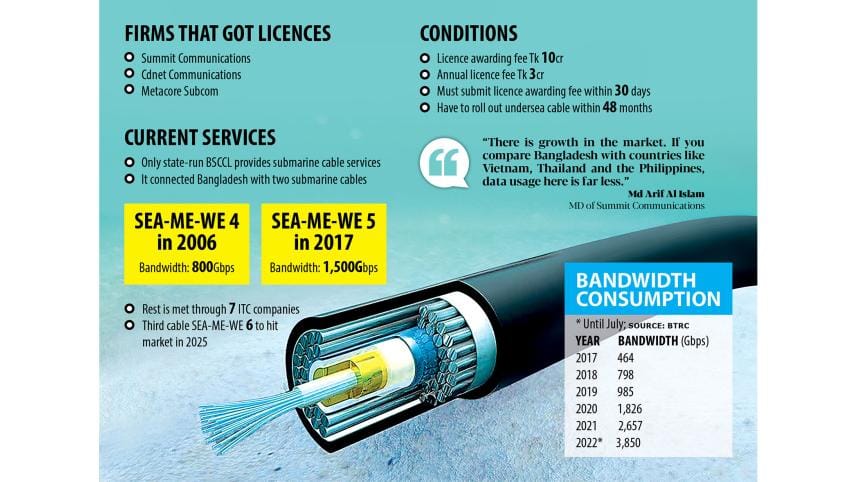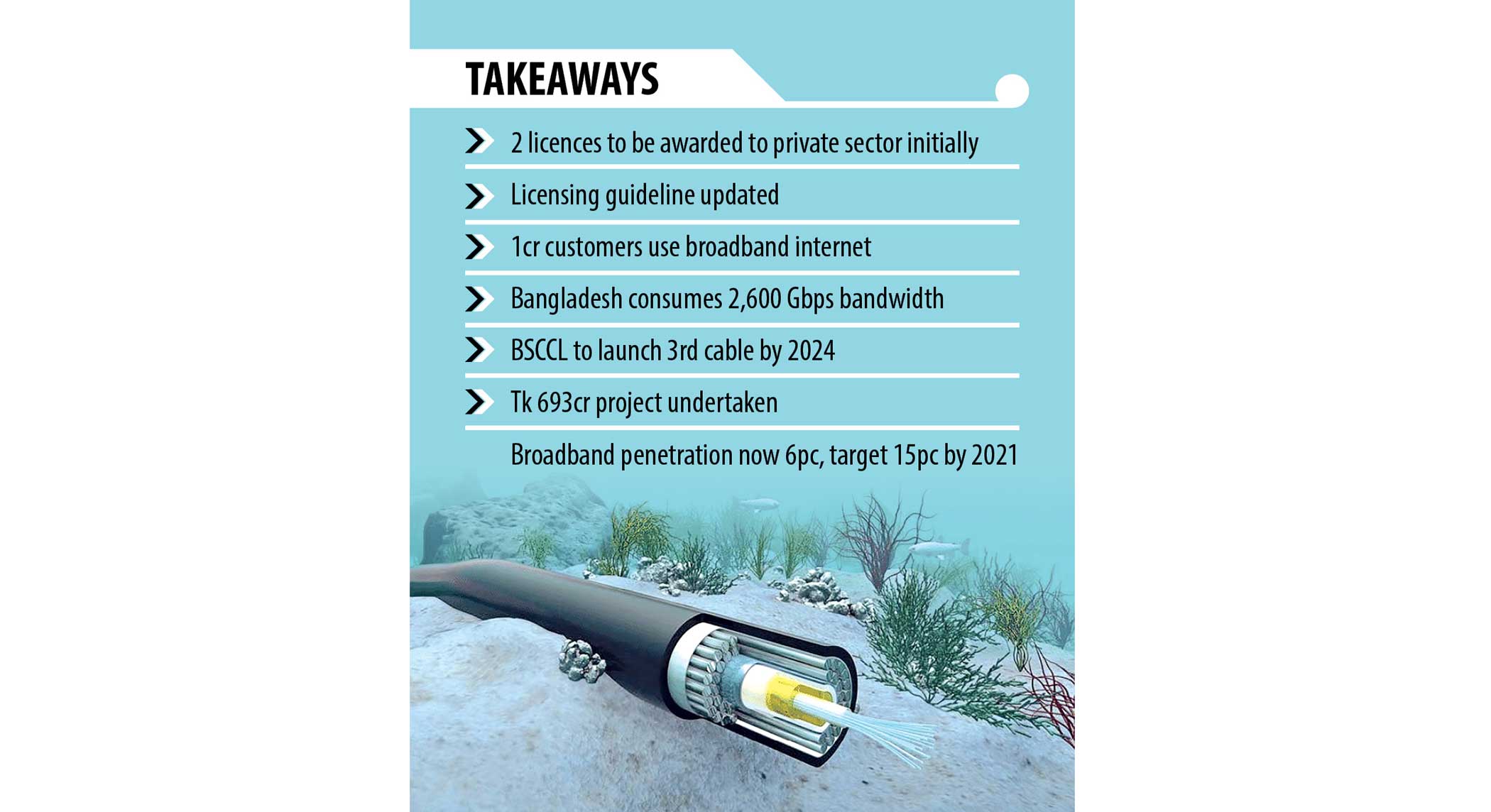3 private firms get nod to lay, run undersea cables

The government has selected three private firms to award them the licence to establish, maintain and operate submarine cables as it looks to ramp up the supply of bandwidth amid a surge in data consumption.
The companies that have received the green light from the Bangladesh Telecommunication Regulatory Commission (BTRC) are Summit Communications, Cdnet Communications, and Metacore Subcom Ltd.
The foray of private companies into the industry is expected to break the state monopoly since Bangladesh Submarine Cable Company Ltd (BSCCL) is the lone entity permitted to connect the country with the rest of the world through undersea cables.
"We have given them a licence because we don't believe that there should be a government monopoly in a sector that is investment-intensive," Mustafa Jabbar, telecom minister, told The Daily Star.
In Bangladesh, private entities have a presence in all areas of the telecommunication sector, including telecom, tower, internet service, and transmission network.
"This will ensure competition in the market," Jabbar added.
"A licence for submarine cable to Metacore Subcom Ltd has been approved," said Ahmed Junayed, managing director of the company.
Now, the company will have to pay the licence fee within 30 working days before receiving the licence from the telecom regulator.
According to the BTRC's guideline, the firms must deposit a licence awarding fee of Tk 10 crore and an annual licence fee of Tk 3 crore. Companies must roll out cables within 48 months.
Initially, six companies had applied for the licence.
Md Arif Al Islam, managing director of Summit Communications, said: "Now we will have to lay fibre cables by joining hands with a regional initiative."
Summit is eying to join Reliance Jio Infocomm of India, NTT Ltd of Japan, or Campana of Singapore.
According to industry people, an investment of $60 million to $100 million is needed to join an undersea cable consortium.
Islam sees growth potential in the market.
"If you compare with Vietnam, Thailand and the Philippines, data usage in Bangladesh is far lower."
Summit is the only end-to-end infrastructure in Bangladesh in the telecom and ICT sector. It has the licence for the nationwide telecommunication transmission network, international terrestrial cable (ITC), and international internet gateway (IIG).
The main partner of Metacore Subcom is Level Three, one of the top IIG operators in Bangladesh.
The foray of the companies into the industry is expected to break the state monopoly since Bangladesh Submarine Cable Company Ltd is the lone entity to connect the country with the rest of the world through undersea cables
"We have a plan to roll out our submarine cable service by 2024. Our full investment will come from a local firm," said Junayed.
BANDWIDTH CONSUMPTION ON THE RISE
In Bangladesh, bandwidth consumption witnessed a remarkable rise during the coronavirus pandemic as people turned to internet to work, study and find entertainment at home.
Bandwidth use surged to 3,850 Gbps in June from 1,000 Gbps before the health crisis erupted, according to the BTRC.
BSCCL supplies 2,300 Gbps while the rest comes from India through seven international terrestrial cable service providers.
Bangladesh is a member of the South East Asia-Middle East-Western Europe 4 (SEA-ME-WE 4) consortium, the first undersea cable with which Bangladesh was connected in 2006. It supplies about 800 Gbps bandwidth.
The state-run entity supplies 1,500 Gbps through the SEA-ME-WE 5. The connection was established in 2017.
The company is set to receive 13,200 Gbps from the third undersea cable, SEA-ME-WE 6, by 2025.
BSCCL is going to spend $3.2 million to raise the capacity of its first undersea cable by more than four times to 4,600 Gbps.
"We are upgrading BSCCL's capacity so that it can meet the bandwidth demand till 2030," said Jabbar.
The bandwidth use is forecast to rise on the back of increasing reliance on internet. There were 12.62 crore internet users in the country in June.
The government also plans to bring about 1 lakh educational institutions under internet connectivity.
If all of the country's classrooms get connected with high-speed internet, the speed of digital growth continues, and 5G is rolled out, the broad projection is bandwidth consumption could rise to 34,000 Gbps by 2025, said Brig Gen Md Nasim Parvez, director-general of the Systems and Services Division of the BTRC, during a recent event.



 For all latest news, follow The Daily Star's Google News channel.
For all latest news, follow The Daily Star's Google News channel. 
Comments